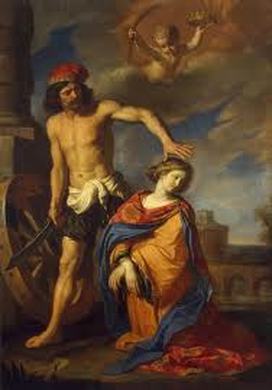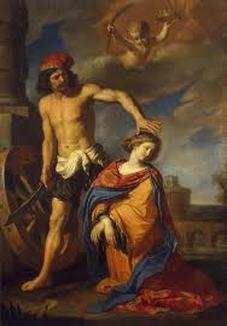
The brave man must first know what the good is, and he must be brave for the sake of the good. It is for the sake of good that the brave man exposes himself to the danger of death Fortitude is not independent, it does not stand by itself. It receives its proper significance only in relation to something other than itself. “Fortitude must not trust itself”, says St. Ambrose.
Every child knows that in the list of cardinal virtues fortitude comes third. This enumeration is not by accident, it has a real meaning and purpose. Fortitude become fortitude through being informed by prudence. For the virtue of fortitude has nothing to do with a purely blind, daredevil spirit. The man who recklessly and indiscriminately courts danger is not for that reason brave; all he proves is that, without preliminary examination or distinction, he considers all manner of things more valuable than keeping his life intact. Prudence as we have seen give inner form to all the other cardinal virtues. With fortitude and temperance they serve to guard and conserve the good of man; it is their function to preserve man from declining from this good.
Fortitude therefore, by itself, is not the primary realisation of the good. But fortitude protects this realisation or clears the road for it. But we also need justice, for without a just cause there is no fortitude. “Not the injury, but the cause makes martyrs,” says St. Augustine. “Man does not expose his life to mortal danger, except to maintain justice. Therefore the praise of fortitude depends upon justice,” says St. Thomas.
ENDURANCE AND ATTACK
To be brave is not the same as to have no fear, yet fortitude does rule out a certain kind of fearlessness, which is based on a false assessment of the danger.
It can be either because we are blind and deaf to the real danger or due to a perversion of love. For fear and love depend on one another. Someone who does not love does not fear either, and he who fears falsely loves falsely. Just as on who has lost the love for his life, and the will to live, is not concerned with the fear of death. He is one who does not love and does not fear.
Fortitude assumes that man has a fear, but that fear does not force the man so much that he chooses to do the evil and not the good. But even the man who exposes himself to a danger - even for the sake of a good-, either from overconfidence, “nothing can possible happen to me”, or from firm confidence in his own strength, do not therefore possess fortitude.
It is only possible to be brave when all possible assurances, either real or those that seem to be real, fail. Thus he can not help being afraid and with good reason, not because he is being an unreasonable wimp. So in the supreme test when every heroic action is useless a man walks straight up to the cause of his fear, not being put off doing what is good, and for the sake of good - that is God- nor for the sake of ambition, or fear of being called a coward, this man alone is truly brave.
The truly brave man is he who cannot be forced to give up the greater good for the lesser and passing goods of this life. He is one who faces what is truly dreadful, by facing injury for the sake of the good, and this facing has two basic act of fortitude: endurance and attack.
Endurance is more of the essence of fortitude than attack. But this does not mean that in every case it is better to endure than attack. Just as we said the true position of fortitude is one where everything is stacked against you and the only option is to suffer and endure. In this situation fortitude is primarily and ultimately shown in it true colours, so to speak.
This enduring is not all just laying back and taking it, for if that was all then it would not be a virtue, for virtue can not be forced on anyone, just as sin can not be forced on us, we sin and are virtuous freely from our will. Therefore this enduring is a firm grasping and grabbing hold of the good, and by this firm act we have the strength to the physical and spiritual suffering of injury or death.
Another necessary part of fortitude is Patience, but not the sad, self-immolating and spineless submission to whatever evil we happen to meet with, or even worse sort out, but it is to preserve cheerfulness and peace of soul and mind in spite of the injuries that come about because we wish to hold onto the true GOOD.
So the man who is brave is patient as well, yet he will not hesitate to “pounce upon” evil and to block its path if he sees that this can be reasonable done. But kind of attitude requires readiness to attack, courage, self-confidence and hope of success, but this hope is naturally in subordination to God. This pouncing upon evil, we may call a just wrath. Thus St. Thomas says, “The brave man uses wrath to pounce upon evil.”
Yet with all this said, when it comes down to it endurance and patience are the essence of fortitude. For it is only in the supreme test, which leaves no possibility of resistance than endurance, that the inmost and deepest strength of man reveals itself. Fortitude then essentially is nothing else than to love and to realise that which is good, in the face of injury and death.
Holy Scripture tells us clearly how true strength is shown when we are left with only resistance as a weapon. St. Paul who was given the sting of Satan to buffet and beat him asked the Lord for strength “ And he said to me: My grace is sufficient for thee: for power is made perfect in infirmity. Gladly therefore will I glory in my infirmities, that the power of Christ may dwell in me. For which cause I please myself in my infirmities, in reproaches, in necessities, in persecutions, in distresses, for Christ. For when I am weak, then am I powerful.”
Christ himself, whose agony is the source of the strength of the martyrs and whose life was one of complete readiness to go “like a lamb to the slaughter”, still did not hesitate to pounce on the evil, when he drove the money changers out of the temple. The readiness to meet the supreme test by dying in patient endurance so as to obtain the ultimate good, does not exclude willingness to fight and to attack. For in the end from this readiness springs the true detachment and freedom which this world can never bring.
Fortitude as a gift of the Holy Ghost
When fortitude is practised to a degree where it is called “Heroic virtue”, that is, fortitude exalted by grace, then the Holy Ghost works “in us without us”, as a gift. The heroic fortitude is the first thing that we require according to St. Teresa of Avila, if we wish to reach perfection. She says, “I assert that an imperfect human being needs more fortitude to pursue the way of perfection than suddenly to become a martyr.”
To obtain this higher degree of fortitude which is obtained by the martyrs, in one powerful leap, the natural forces of endurance cannot reach. They are replaced by the Holy Ghost, with the gift of Fortitude, giving to man the unshakeable though still veiled supernatural certainty of the happy final victory, it pours into the soul a confidence that overcomes all fear, namely, that God will lead man to eternal life, the ultimate end of all good actions, and the final deliverance from every kind of danger.
This supernatural fortitude crowns all “natural’ modes of Christian fortitude, for to be brave and suffer death and injury means you hope to win, without this hope fortitude is impossible. The higher the victory, the more certain the hope, and the more we are willing to risk to obtain it.
To die without hope is harder and more fearful than dying in the hope of eternal life. What matters is not the ease of difficulty of a thing, but “the truth of things”. What matters is the reality of eternal life. And the rectitude of hope lies in the fact that it corresponds to this reality.
What hope really is, no one can know more deeply than he who must prove himself in the supreme test of ultimate fortitude, for to him it is revealed clearly that the hope for eternal life is truly a gift, and without this gift there cannot be any such thing as truly Christian fortitude.





